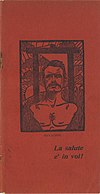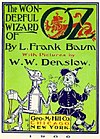Featured articles
Featured articles · candidates · collaboration of the week
May 1
La Salute è in voi! ("Health/Salvation is in you!") was an early 1900s bomb-making handbook associated with the Galleanisti, followers of anarchist Luigi Galleani, particularly in the United States. The anonymously written, Italian-language handbook repackaged technical content from encyclopedias and applied chemistry books into plain directions for non-technical amateurs to build explosives. It wrapped this content in a political manifesto advocating for impoverished workers to overcome their despair and commit to individual, revolutionary acts. American police and historians used the handbook to profile anarchists and imply guilt by possession. It figured prominently in the prosecution of the Bresci Circle, a case that revolved around the anarchists' right to read. Successful political bombers of this era ultimately had career backgrounds in explosives and were not the self-taught amateurs the handbook sought to create. (Full article...)
April 1
The Nintendo Entertainment System is an 8-bit video game console released by Nintendo in North America, Europe and Australia. The most successful gaming console of its time, it helped revitalize the video game industry following the video game crash of 1983, and set the standard for subsequent consoles in everything from game design (the first modern platform game, Super Mario Bros., was the system's first "killer app") to business practices. The NES was the first console developer to openly court third-party developers. So dominant was the NES during its heyday—roughly 1985 through 1991—that the period has become colloquially known as the "Nintendo era." As the 1990s dawned, however, renewed competition from technologically superior systems such as the 16-bit Sega Mega Drive (also known as the Sega Genesis) marked the end of the NES's dominance. Eclipsed by Nintendo's own Super Nintendo Entertainment System (SNES), the NES's user base gradually waned and in 1995 Nintendo officially discontinued the NES. (more...)
Recently featured: Bicycle – George Fox – The Supremes
March 1

The Space Race was the competition between the United States and the Soviet Union roughly from 1957 to 1975, involving their efforts to explore space with satellites and to eventually land a human being on the Moon and return him to Earth. Though its roots lie in early rocket technology and in the international tensions following World War II, the Space Race effectively began with the Soviet launch of Sputnik in 1957. The term was coined as an analogy to the arms race. The Space Race became an important part of the cultural and technological rivalry between the USSR and the U.S. during the Cold War. Space technology was a particularly important arena in this conflict, both because of its military applications and due to the psychological benefit of raising morale. (more...)
Recently featured: Hrafnkels saga – Great Lakes Storm of 1913 – Lord's Resistance Army
February 1
Mahatma Gandhi was the charismatic intellectual and mass-movement leader who brought the cause of independence for British colonial India to world attention. His ideas, especially the satyagraha model of non-violent protest, have influenced both nationalist and internal movements throughout the world. By means of non-violent civil disobedience, Gandhi helped bring about India's independence from British rule, inspiring other colonial peoples to work for their own independence and ultimately dismantle the British Empire and replace it with the Commonwealth of Nations. Gandhi's principle of satyagraha ('"truth force"), often roughly translated as "way of truth" or "pursuit of truth," has inspired other democratic activists, including Martin Luther King Jr. and Nelson Mandela. He often stated his values were simple, drawn from traditional Hindu beliefs: truth (satya), and non-violence (ahimsa). (more...)
Recently featured: Super Mario 64 – Laal language – Pulaski Skyway
January 1
Alchemy is an early protoscientific practice combining elements of chemistry, physics, astrology, art, semiotics, metallurgy, medicine, mysticism, and religion. Two intertwined goals sought by many alchemists were the philosopher's stone, a mythical substance which would enable the transmutation of common metals into gold; and the universal panacea, a remedy that would cure all diseases and prolong life indefinitely. European alchemy continued in this way through the dawning of the Renaissance. The era also saw a flourishing of con artists who would use chemical tricks and sleight of hand to "demonstrate" the transmutation of common metals into gold. Alchemy can be regarded as the precursor of the modern science of chemistry prior to the formulation of the scientific method. (more...)
Recently featured: Planetary nebula – Max Weber – Turquoise
December 1
The Battle of the Bulge was the last major German offensive on the Western Front in World War II. It was intended that the German forces would split the Allied line in half, capture Antwerp, sweep north and encircle and destroy four Allied armies, thus forcing them to negotiate for peace. Although unsuccessful, it nevertheless tied down huge amounts of Allied resources, and a slow response to the resulting gap in their lines erased months from their timetable. An alternative analysis is that the offensive allowed the Allies to severely deplete the cream of German army outside the defenses of the Siegfried Line and in poor supply state, greatly easing the assault on Germany afterward. In numerical terms, it is the largest battle the United States Army has ever fought. (more...)
Recently featured: Mercedes-Benz 450SEL 6.9 – Celtic Tiger – Mozilla Firefox
November 1
The World Wide Web is a distributed hypertext system that operates over the Internet. Hypertext is browsed using a program called a web browser which retrieves pieces of information (called "documents" or "web pages") from web servers (or "web sites") and displays them on one's screen. One can then follow hyperlinks on each page to other documents or even send information back to the server to interact with it. The act of following hyperlinks is often called "surfing" the web. The Web can be traced back to a project at CERN in 1989 when Tim Berners-Lee and Robert Cailliau built ENQUIRE. (more...)
Recently featured: Infinite monkey theorem – Louis XIV – Speed of light
October 1
The Battle of Normandy in 1944, codenamed Operation Overlord, was the invasion of Nazi-occupied Western Europe by the Allies. The Normandy invasion began with overnight paratrooper and glider landings, massive air and naval bombardments, and an early-morning amphibious assault. It continued over more than two months, with campaigns to establish, expand, and eventually break out of the Allied beachheads. It concluded with the surrender of Paris and the fall of the Chambois pocket. Normandy is, to this day, one of the best-known battles of World War II. In common language, the expression "D-Day" is still used to refer to June 6, the starting date of the invasion and the opening day of the battle (more...)
Recently featured: Ridge Route – Adoption in ancient Rome – Split infinitive
September 1
Under English common law, a common scold was a species of public nuisance—a troublesome and angry woman who broke the public peace by habitually arguing and quarrelling with her neighbours. The Latin name for the offender, communis rixatrix, appears in the feminine gender, and makes it clear that only women could commit this crime. The prescribed penalty for this offence involved dunking the convicted offender in water in an instrument called the cucking stool, which by folk etymology became ducking stool. The stool consisted of a chair attached to a lever, suspended over a body of water; the prisoner was strapped into the chair and dunked into the water for her punishment. (more...)
Recently featured: Ferdinand Magellan – Tank – Traditional counties of England
September 6
The Warsaw Uprising was an armed struggle during the Second World War by the Polish Home Army (Armia Krajowa) to liberate Warsaw from German occupation and Nazi rule. It started on August 1, 1944 as a part of a nationwide uprising, Operation Tempest. The Polish troops resisted the German-led forces until October 2. An estimated 85% of the city was destroyed during the urban guerrilla war and after the end of hostilities. The Uprising started at a crucial point in the war as the Soviet army was approaching Warsaw. Although the Soviet army was within a few hundred metres of the city from September 16 onward, the link between the uprising and the advancing army was never made. This failure and the reasons behind it have been a matter of controversy ever since. (more...)
Recently featured: Anno Domini – PaX – Behistun Inscription
August 1
Quantum mechanics is a physical theory that describes the behaviour of physical systems over small distances. It is the underlying framework of many fields of physics and chemistry, including condensed matter physics, quantum chemistry, and particle physics. It is derived from a small set of basic principles, and explains four types of phenomena that classical mechanics and classical electrodynamics cannot account for: quantization, the uncertainty principle, wave-particle duality, and quantum entanglement. (more...)
Recently featured: Typewriter – History of Scotland – Radar
July 1
Blackjack is one of the most popular casino card games in the world. Much of its popularity is due to the mix of chance with elements of skill and decision making, and the publicity that surrounds the practice of card counting, in which players can turn the odds of the game in their favor by making betting and strategy decisions based on the previous hands of cards that have been dealt. Casinos strongly frown upon card counting, but it is a difficult skill to master and few players are successful at it. In blackjack, the players bet against the house dealer rather than against each other. The goal of each player is to have a higher point total than the dealer without going over 21. (more...)
Recently featured: John Major – Revised Standard Version – Synapse
June 1
Simon and Garfunkel were a popular music duo comprisingPaul Simon and Arthur "Art" Garfunkel. Simon and Garfunkel were among the most popular recording artists of the 1960s, and are best known for their songs, "The Sound of Silence", "Mrs. Robinson" and "Bridge Over Troubled Water". They received several Grammies and are inductees of the Rock and Roll Hall of Fame. (more...)
Recently featured: Helium – Chinatown – Vowel
May 1
The Wonderful Wizard of Oz is a children's story written by L. Frank Baum, illustrated by W.W. Denslow, and first published in 1900. The story chronicles the adventures of a girl named Dorothy in the land of Oz. It is well regarded in popular culture and has been widely translated as the first American fairy tale due to its setting. Its initial success led to Baum writing and publishing thirteen more Oz books. (more...)
Recently featured: space elevator – Carlsbad Caverns National Park – Beer
April 1
The Byzantine Empire was the eastern section of the Roman Empire which remained in existence after the fall of the west. The empire is commonly considered to have existed from AD 395 to 1453. The empire reached its height under the Macedonian emperors of the late 9th, 10th and early 11th centuries. The Fourth Crusade had a devastating effect on the empire, and it was conquered by the Ottoman Empire in the 15th century. (more...)
Recently featured: Superman – Jet engine – Yellowstone National Park
March 1
Propaganda is information, true or false, disseminated to serve an agenda. Even if true, it may be partisan and fail to paint a complete picture. Propaganda shares many techniques with advertising. However, propaganda usually has political or nationalist themes. Many of the techniques used in propaganda are logical fallacies, since propagandist views are arguments which, although sometimes convincing, are not necessarily valid. (more...)
Recently featured: LSD - Periodic table - Psychosis











